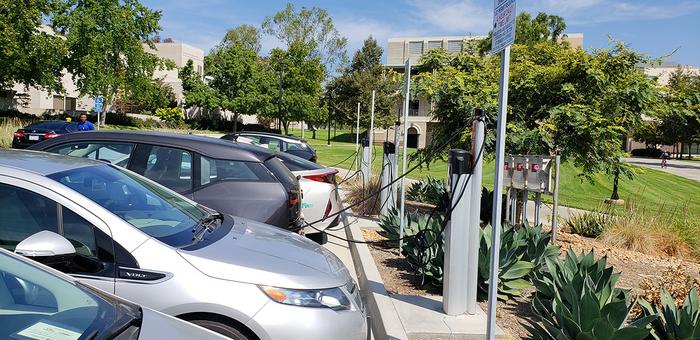A significant advancement has emerged from the University of California, San Diego, where researchers have crafted a pioneering computational tool that aims to revolutionize the design of electric vehicle (EV) charging networks. This novel tool hinges on the actual behavior patterns of drivers as they use and recharge their electric vehicles, positioning it as an essential resource for institutions navigating the shift toward electric mobility. As the demand for EVs continues to grow, understanding the intricacies of how drivers charge their vehicles has never been more critical.
Traditionally, the design of EV infrastructure has relied heavily on average data or theoretical assumptions regarding user behavior. In stark contrast, this research seeks to base design principles on the real-life practices of EV drivers, acknowledging the complexities and diversities in charging habits. This data-driven approach promises to create networks that are not only efficient but also tailored to meet the varying needs of different groups of users, including those who live in multi-dwelling units or lack access to home chargers.
According to the study, published in the reputable journal Renewable Energy, the findings challenge conventional wisdom surrounding EV charging. The researchers collected anonymized behavioral data from more than 800 EV drivers over the past year, alongside detailed charging data from 439 charging stations on the UC San Diego campus, which boasts the Western world’s largest EV charging network at an academic institution.
One of the pivotal revelations of this research is that many EV drivers prefer to charge their vehicles when the battery levels remain above 60%. This behavioral insight contradicts previous estimates that over-simplified user charging habits. Understanding this key preference allows for a more nuanced design of charging networks that can accommodate actual usage patterns rather than baseless assumptions.
The implications of these findings are substantial. Utilizing detailed, individualized driver behavior instead of generalized averages may result in a tripling of the predicted network size necessary for adequate workplace charging. This revelation is not merely theoretical; it bears significant practical implications regarding the efficiency, cost-effectiveness, and environmental benefits of how organizations implement these networks.
The researchers emphasize the pressing need for workplace charging policies that evolve alongside these new insights. Managed charging, which optimally adjusts the vehicle charging process to balance the requirements of the driver and the electric grid, could lead to more efficient use of charging stations and diminish the necessity for an expanded number of chargers.
Importantly, this computational tool will be made available to the public, ensuring that businesses and organizations can implement its findings in their efforts to support employees transitioning to electric vehicles. By inputting specific data, such as annual driving mileage and charging habits, firms can optimize their charging infrastructure to better serve their workforce. For organizations unable to gather comprehensive data, the model remains robust enough to function with average EV driver statistics.
Moreover, the broader impact of such tailored charging networks extends beyond simply responding to employee needs. They present an opportunity for workplaces to advance their sustainability goals, thereby reducing emissions associated with commuting. The study’s lead authors, Ryan Hanna and Jeff Myers, alongside a collaborative research team, promote the idea that understanding EV drivers’ behaviors can facilitate greener practices across various industries.
The research aligns with UC San Diego’s ambitious climate strategies and serves as a beacon for other organizations aspiring to make similar strides in sustainability. By integrating findings into their infrastructures, institutions not only contribute to environmental efforts but also enhance the employee experience, particularly for those making the transition to electric vehicles.
As EV adoption rates surge, organizations at every level must acknowledge the shifting dynamics of mobility and the varying needs of their employees. By adapting to these changes and prioritizing real-world data in the design of charging networks, businesses place themselves at the forefront of a sustainable future. Through this study, UC San Diego sets a precedent, showcasing how data-driven approaches can effectively respond to the evolving landscape of electric mobility while reaping the environmental and economic benefits that accompany such changes.
The upcoming deployment of this computational model could redefine how workplaces engage with this pressing global challenge. In its essence, the tool aims to create a more equitable framework for EV drivers, especially those without personal charging options. The ongoing shift to electric vehicles demands not just technical solutions but a profound understanding of user behavior—an understanding that this innovative research successfully cultivates.
By prioritizing data-informed strategies, organizations can unveil a model that aligns with both employee needs and burgeoning sustainability goals. This approach not only addresses current charging challenges but also sets a foundation for resilient infrastructures capable of adapting to future needs. The culmination of this research speaks to a transformative shift that, if widely adopted, could serve as a blueprint for institutions worldwide seeking to revolutionize their transportation frameworks amidst an electric revolution.
Ultimately, as the study suggests, the pathway to a successful EV future lies not only in the proliferation of charging stations but also in a fine-tuned understanding of EV driver behavior. This shift from a generic to a personalized approach underscores the potential for sustainable practices to be embedded within organizational designs and policies, paving the way for a more environmentally conscious world.
Subject of Research: People
Article Title: Design of workplace and destination-based EV charging networks considering driver behavior, habits, and preferences
News Publication Date: October 2023
Web References: UC San Diego EV Network
References: Renewable Energy
Image Credits: UC San Diego
Keywords: Electric Vehicles, Charging Networks, Driver Behavior, Renewable Energy, Sustainability.




